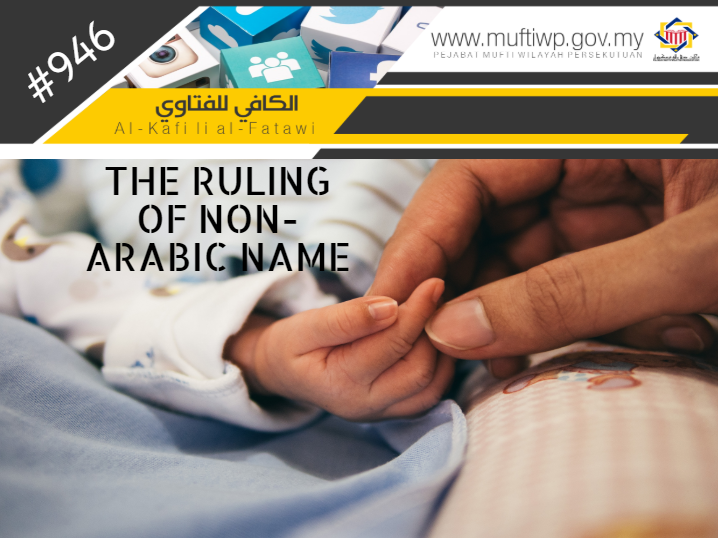Question:
What is the ruling of naming one’s child with ‘ajam (non-Arabic) names such as Richard, Bunga, Kuntum, Cheng Ho and Ramasamy?
Answer:
Alhamdulillah, praise and thanks to Allah for the countless blessings He has blessed us all with. Blessings and salutations to the Prophet Muhammad PBUH, his wives, his family, companions and all those that follow his teachings to the day of judgement.
In Islam, when a child is born, the parents are to name their child with good names that do not hold the meaning of being enslaved to other than Allah SWT nor does it contain elements of arrogance, boastfulness and bad meanings.
Hence, naming one’s child with good names is encouraged for it is a form of supplication and these are the names that will be called in the hereafter.
From Abi Darda’ RA, the Prophet PBUH said:
إِنَّكُمْ تُدْعَوْنَ يَوْمَ الْقِيَامَةِ بِأَسْمَائِكُمْ وَأَسْمَاءِ آبَائِكُمْ فَأَحْسِنُوا أَسْمَاءَكُمْ
“On the Day of Resurrection, you will be called by your names and by your father's names, so give yourselves good names.”
Sunan Abu Daud (4948)
According to the above question, as long as the name’s meaning does not have the meaning that could lead to shirk or the above stated prohibited meanings, then it is permissible. This is the opinion of most fiqh scholars and the prioritized names are the names that showcased one as the slave of Allah SWT or honourable names.
From Ibn Umar R.Anhuma, the Prophet PBUH said:
إِنَّ أَحَبَّ أَسْمَائِكُمْ إِلَى اللَّهِ عَبْدُ اللَّهِ ، وَعَبْدُ الرَّحْمَنِ
“The names dearest to Allah are 'Abdullah and 'Abd al-Rahman.”
Sahih Muslim (6/169), Abu Daud (2/307), al-Tirmizi (4/29), al-Nasa’ie (2/119), Ibn Majah (2/404), al-Darimi (2/294), Ahmad (4774) dan al-Hakim (4/274)
In concluding our answer, we will include the opinion of Dr Yusuf al-Qaradhawi who said: “Fiqh scholars do not prohibit, as far as I know, naming a child with non-Arabic names, as long as the meaning is good in a certain language. Most Muslims maintain their non-Arabic names for man and woman after they embraced Islam, even when they live in Arab countries and cultures.
Some examples are Mariyyah al-Qibtiyyah, the mother of Abraham whom the son of the Prophet PBUH who is also known as al-Qibti al-Misri.
There are also companions of the Prophet PBUH and the tabi’in whose names are originated from the names of plants. For example, Talhah (Talhah tree), Salmah (Salmah tree) and Handzalah (a tree which fruit is very bitter).
Or names which are taken from the names of animals and birds, such as asad (lion), fahd (cheetah), haitham (dessert lion) and saqr (eagle).
Or the names of creations or nature such as bahr (sea), jabal (hill) and sakhar (huge rock).
Or names that come from certain meanings. For example, ‘Amir (longevity), Salim (prosperous). Umar (people who are blessed with longevity), Said (happiness), Fatimah (separated from nursing), Aisyah (lively), Safiyyah (pure) and Maimunah (trustworthy).
Or names of respected or prominent prophets and pious people before them such as Abraham (Ibrahim), Ismail (Ishmael), Yusuf (Joseph), Musa (Moses) and Maryam (Mary).
According to the above guidelines, a Muslim is permissible to name his son or daughter with Arabic or non-Arabic names. (See Fatawa Mu’asirah, 2/404-405)
However, we suggest to give a name with good meaning and do not has any elements of shirk while putting our hope and prayers along with the name we chose. We also advise choosing a name that is different from the non-Muslims. The same with the usage of bin and binti where it should be maintained. The purpose of it is so that it will not lead to confusion as to whether or not someone is a Muslim based on the chosen name. It is best to choose a name that if mentioned, everyone is certain that it is a Muslim’s name or otherwise.
May Allah SWT bless us with children who have taqwa and be among the pious Muslimin. Amin.


